“Sons of Mogh”
Written by Ronald D. Moore
Directed by David Livingston
Season 4, Episode 14
Production episode 40514-487
Original air date: February 12, 1996
Stardate: 49556.2
Station log: Worf and Dax are working out in a holosuite and flirting outrageously when they’re interrupted by Odo. Worf’s brother Kurn has arrived on the station, exceedingly drunk, and wants Worf to perform the Mauk-to’Vor ceremony on him. It’s a Klingonish form of seppuku, whereby a Klingon warrior regains his honor by being ritually killed by a family member. Worf’s being cast out of the empire by Gowron has resulted in all the House of Mogh’s lands being seized, Kurn’s seat on the High Council lost.
Kurn is, of course, livid, as he had to stand around and watch Gowron take the House of Mogh apart. He’s lost everything, and only Worf can give him his honor back. Worf agrees, acquires some adanji (a type of incense) from Quark, and uses a mevak dagger to stab Kurn.
Dax, who found out about the acquisition of the adanji, takes Odo to Worf’s quarters just as Kurn is impaled. Dax beams Kurn to the infirmary.
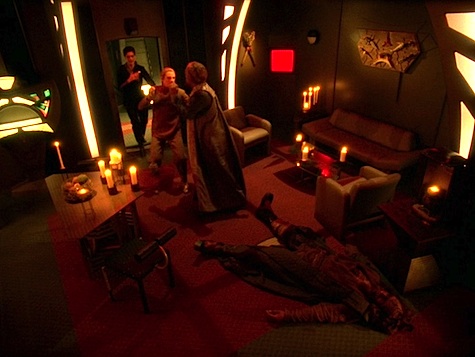
O’Brien and Kira return on the Yukon from an inspection tour of the Bajoran colonies on the Cardassian border when they encounter an explosion just outside the Bajoran system. As they investigate, a Klingon ship decloaks and warns them off, saying it’s a military exercise.
Bashir saves Kurn and Sisko makes it clear that his willingness to tolerate diversity and cultural relativism ends at premeditated murder. Sisko also instructs Kira to investigate the Klingon activity outside the Bajoran system with the Defiant, but not to take Worf along under any circumstances. They find traces of cloaked ships just outside the Bajoran system—and then a Vor’cha-class cruiser decloaks with a huge-ass hole in its hull. Initially they decline assistance, but then agree to a tow back to Deep Space 9 for medical aid.
Kurn awakens in the infirmary, and realizes that Mauk-to’Vor isn’t an option. He realizes that he has no life and no death. Whatever happens to him now is up to Worf. So Worf, at Dax’s suggestion, approaches Odo about putting Kurn on his security team. Assuming Kurn can remember to use the stun setting on his disruptor, Odo agrees. He does quite well—at first. But when he is drawn on by a smuggler, Kurn just stands there and lets himself get shot. Odo refuses to keep someone with a death wish on his security detail.
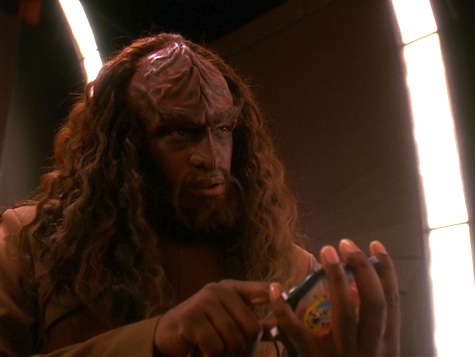
Bashir reports that the injuries he treated among the Klingons the Defiant brought back were all consistent with the damage to the ship. Based on the sensor readings they got—and didn’t get—Worf hypothesizes that the Klingons are placing cloaked mines around the Bajoran system in order to cut DS9, Bajor, and the wormhole off if all-out war breaks out. Worf suggests that he and Kurn beam onto the Klingon ship to hack their computer and find the location of the mines. Kurn is revolted at the further dishonor, and he’s less than impressed by Worf’s rationalization that the Klingons were dishonorable first by laying cloaked mines. But he agrees, and the pair of them are disguised by Bashir, complete with a DNA profile matching two of his patients, and then beamed onto the ship. Kurn bypasses a security block, and then they’re forced to kill a lieutenant who catches them.
Kurn killed the lieutenant because he saw that he was going to try to kill Worf—Worf himself didn’t see it. He realizes at last that he has no place in the empire. He can’t even think of Mauk-to’Vor as anything but murder.
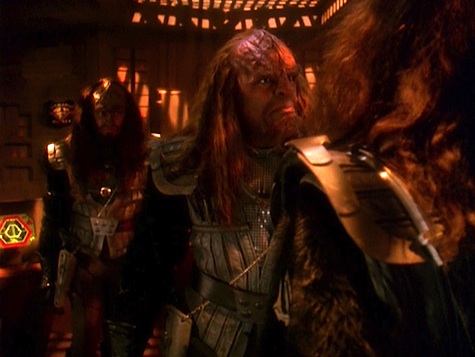
Kira takes the Defiant out and gives the Klingons a single warning that she’s going to detonate their minefield. Nobody moves, so Kira blows up one section of mines. Still nothing, so she detonates the majority of the mines. Then, suddenly, ships decloak and bugger back to Klingon space.
Worf finds Kurn drunk and pointing a disruptor at his own head. Worf takes the disruptor away and then Kurn passes out. Then he takes Kurn to Bashir, who wipes his memories, changes his DNA profile, and alters his face. An old family friend of Worf’s named Noggra has agreed to give Kurn a new name and a new family. He is now Rodek, and he goes off with Noggra.
Can’t we just reverse the polarity?: Cloaked mines are apparently undetectable. Also Klingons have been using false computer directories to stymie spies. Luckily, Kurn, as an ex-member of the High Council, was in on that plan and is able to bypass it when he and Worf are committing espionage.
The Sisko is of Bajor: When Worf tries to kill his brother on the station, Sisko rips him a new asshole, and rips Dax one while he’s at it. (When O’Brien tries to defend his former shipmate, Sisko doesn’t even let him get started before threatening to rip him one, too.)
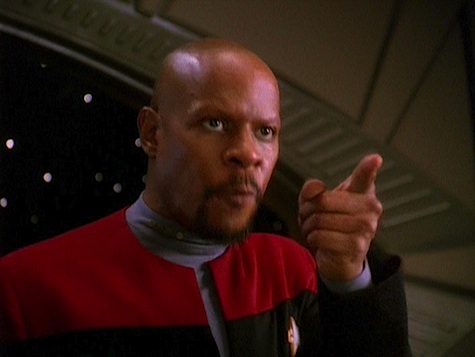
Don’t ask my opinion next time: Kira sleeps for the entire seven-hour trip from the Bajoran colonies she and O’Brien were inspecting. She’s stunned when O’Brien wakes her, saying she doesn’t sleep for seven hours on the station. (O’Brien jokes that it’s probably the company.)
The slug in your belly: Dax figures out what Worf is doing as soon as she learns that Worf got adanji from Quark and that his visitor is also his brother. She’s also the one who suggests putting Kurn in Odo’s security squad and also comes up with the idea of changing his identity. She and Worf have also been doing sword drills in the holosuite, with Worf singing the praises of the mek’leth over the bat’leth.
There is no honor in being pummeled: Worf is faced with the consequences of his actions, as he made the decision to not back Gowron’s invasion from the safety of the Federation. It is his younger brother who had to face the humiliation of having the House of Mogh ripped to pieces.
Preservation of mass and energy is for wimps: Odo does a favor for Worf by bringing Kurn onto his security detail. We never do find out what Worf does to return the favor…
Tough little ship: As soon as posturing needs to be done with the Klingons, Sisko is sure to send the Defiant.
No sex, please, we’re Starfleet: Worf and Dax’s workouts on the holodeck aren’t foreplay. Probably. Never mind that Worf accuses Dax of wearing a cleavage-y outfit to distract him, while Dax accuses Worf of doing the same with all his manly grunting.
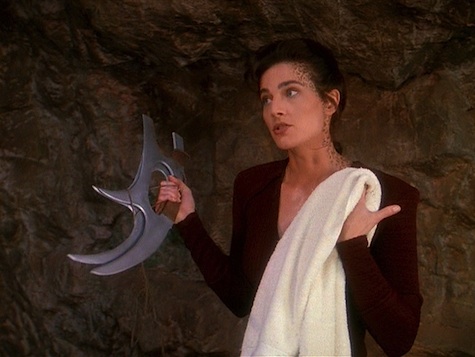
What happens on the holosuite stays on the holosuite: So far, every time a Klingon does a sword drill on the holosuite—Koloth in “Blood Oath,” Worf and Dax in “The Way of the Warrior” and here—it’s always a cave. I liked the overgrown industrial complex Worf had on the Enterprise better…
Keep your ears open: “There. Very ugly. Uglier, that is. A joke.”
“I got it.”
Bashir trying to make a funny and going up against Worf’s glacier-like mien.
Welcome aboard: Tony Todd makes his fourth and final appearance as Kurn, having played the part on TNG thrice—“Sins of the Father” and the “Redemption” two-parter—also his second appearance of the season, as the actor played the older Jake Sisko in “The Visitor.” Robert DoQui plays Noggra.
Trivial matters: This episode follows up on the consequences of Worf’s being kicked out of the Klingon Empire in “The Way of the Warrior.” Kurn was established as having a seat on the High Council in TNG’s “Rightful Heir.”
Although the producers discussed the possibility of bringing Tony Todd back as Rodek, son of Noggra, it never happened on screen. This is rather too bad, as Worf will eventually be accepted back into the good graces of the empire, leaving Kurn stuck in this new personality, suffering a disgrace that no longer matters. Rodek appeared in Vengeance by Dafydd ab Hugh and in the various novels by your humble rewatcher featuring the I.K.S. Gorkon, on which Rodek served as gunner and later second officer. An injury suffered in the novel Honor Bound leads to some of his memories starting to return, and in A Burning House (which takes place four years after this episode), he gets all his memories back. However, when given the choice between staying as Rodek or going back to being Kurn, he chooses Rodek and forsakes Worf.
According to John Eaves, the illustrator who designed the mevak dagger used for the Mauk-to’Vor ritual, the weapon has two blades: one to kill the body, the other to release the spirit to Sto-Vo-Kor.
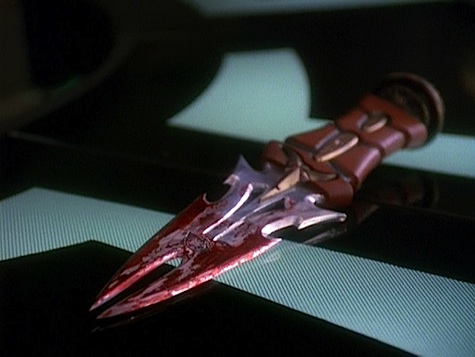
While the weapon was created by visual effects supervisor Dan Curry for Michael Dorn when he joined DS9 in “The Way of the Warrior,” this episode is the first time the mek’leth is named. Worf will continue to use it throughout DS9 and also in the movie First Contact.
Walk with the Prophets: “I have no family.” I always hated this episode because the ending just felt like a copout to me. And then I hated it even more later when Worf would get his mojo back and poor Kurn was stuck being Rodek, son of Noggra—but that’s not really this episode’s fault.
Because of that, I hadn’t actually watched the episode in some time. I’d watched the ending (which I hated) several times as prep for when I wrote Rodek in the assorted Klingon novels I’ve written, but I hadn’t watched the preceding episode very much.
And to my surprise, it’s a damn good one. One of the issues I had with Worf’s agreeing to discommendation back in “Sins of the Father” was that it didn’t have much by way of real-world consequences for Worf. He was pretty much the same person before and after. Since then, though, Worf had his family name restored, he had a huge influence on Klingon politics, and twice we glimpsed possible futures in which he was an important personage in the Klingon Empire, where he did go home again—in “Firstborn,” where he got a seat on the High Council and “All Good Things…” where he was a planetary governor.
What this episode does is make things a bit more real for Worf. In “Sins of the Father,” Kurn was able to maintain the public fiction that he was the son of Lorgh, so he was spared Worf’s first disgrace, but now he’s at the heart of it. Tony Todd plays Kurn’s despair magnificently, gives us a warrior who’s done nothing wrong, but has been denied the honor he deserves. Every time he tries to regain his honor, he just goes further and further down the path to destruction, culminating in being forced to kill an honorable warrior to save his brother’s life and preserve his mission.
And watching this episode again has also revealed something that I never really noticed before. Every time Worf has been forced to swallow shit in order to preserve the empire, he’s the one who’s been the honorable Klingon while others have been less than honorable. Worf has always been the ideal Klingon because he’s never had to live with the day-to-day realities of the Klingon Empire. Safe in the Federation, he can afford to be ideal because he doesn’t have to deal with the compromises of real life.
In this episode, Ronald D. Moore magnificently turns that on its ear. Kurn is the one who is the pure Klingon here. He has served his people with distinction, been a captain, a member of the High Council, part of a noble House—and all it’s gotten him is stuck on a Bajoran space station with a bottle in one hand and a disruptor in the other. He castigates Worf for not fighting off Dax and Odo when they stop the Mauk-to’Vor ritual, for living in comfort (a rerun of their conversation about being at ease on the Enterprise in “Sins of the Father”), for letting his human judgment impair his Klingon honor. It’s Worf who is finally compromised, Worf who finds he can’t maintain the balance between Federation and empire and realizes that the Federation is all he has left. For the first time, those possible futures we saw of Worf serving in the empire seem less and less likely.
Warp factor rating: 7
Keith R.A. DeCandido will be at Lunacon 2014 this weekend in Rye Brook, New York, alongside guests such as Ryk E. Spoor, Michael F. Flynn, Randy Gallegos, and more. His schedule is here.










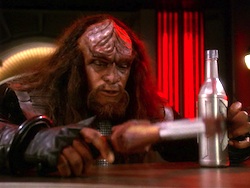
I just can’t sympathize with Kurn here, and the whole idea of Mauk-to’Vor seems paradoxical to me. Klingons are supposed to be fighters who define themselves by strength and honor. What’s more anathema to that than just giving up and killing yourself? It seems to me more like an act of cowardice than honor. Okay, so things are bad? Deal with it! Find a solution! This episode turned the formerly impressive Kurn into a rather pathetic character, and I didn’t care for it at all.
This really is a pretty good episode, right up until the ending. I hate, hate, HATE the ending. I don’t honestly know what bothers me the most: that Dax suggested lobotomizing Kurn without his consent, that Worf went along with it, or that Bashir was willing to do it.
I think the general idea of committing a kind of seppuku does make sense for a Klingon – but the thing that confuses me here is why Kurn, as the representative of the House of Mogh, cannot simply disavow Worf (with the possible consequence that if they ever come face to face, Kurn would have to kill him). What Worf did might be considered dishonorable for a Klingon warrior, but that’s still a personal failure, not one of his House (not to mention that it’s not the House of Worf, so he’s apparently not even the sole ruler).
I agree that the ending is pretty horrific from a ethical standpoint. And the whole situation just highlighted my general complaints about Klingon honor based culture in general.
Still, it was frustrating to me because we’ve seen Worf/his house recover from disgrace before, so taking such a permanent solution (be it killing yourself, or the brain wipe) is just…ugh.
I mean, say what you will about Dukat, but at least he’s DOING something ;)
#3. Sadly, I think with Klingons, if a member of a family does something that is considered dishonorable, it dishonors the whole House/family. That’s what I got out of “Sins of the Father” and in that case, it wasn’t because Mogh was the head of the House of Mogh, but a member of it. The same is true with Duras.
Yeah, the ending here is just a complete failure, not to mention the utter lack of a follow-up once Worf’s honor is restored. And that does drag down an otherwise good episode. It’s almost as though the writers simply couldn’t come with another ending that would allow Kurn to get on with his life.
I also think this sort of ritual suicide does make a certain amount of sense for Klingons. Because he and his whole house have been stripped of his honor, Kurn can’t challenge anyone in an effort to regain it. He can’t fight and/or die well in battle for the same reason. He doesn’t even have the right to kill himself, the paterfamilias has to do it for him. In fact, I can see that as the origin of the Mauk-to’Vor. A dishonored family member is ritually killed to remove his stain from the family’s honor and by voluntarily accepting it, he regains enough honor that his descendants are not tainted and he gets into Sto’vo’kor.
I think there’s also enough precedent in Terran warrior societies. Certainly a dishonored samurai was expected to commit seppuku. And there was one Spartan survivor of Thermopylae (he was sick and blind at the time of the battle). He was downgraded to Trembler and his daughters were forbidden to marry. Then at Plataeae, he charged the Persian lines well in advance of his phalanx and was killed. The Spartans decided that was just barely enough to give him back his honor and let his daughters marry after all.
@1
In defense of the Klingon’s point of view, Worf asked the exact same thing of Riker, four years prior to this episode. Worf was able to overcome that obstacle. Not so much with Kurn.
Sometimes, characters are too problematic or knee deep in crisis to take the traditional third act approach of overcoming one’s personal demons. The way I see it, this might be perceived as pathetic to some. I, however, see it as a gutsy way to end a character’s arc, without resorting to something as overdone as death.
@1, I had the same thought about the practice’s lack of honor, CLB, but I suppose one can probably find similar logical inconsistencies in real life religions and cultures. So I guess it’s a fault in the honor system, but not necessarily a fault in the world-building?
But yeah, some of the logistics of the honor-stripping are a bit funky to me. The chancellor can unilaterally strip an entire house of its honor and property? The (admittedly ceremonial) emperor, Kahless himself, Worf’s buddy, has no say? The High Council has no say? @3, you raise a good point, Torvald, about why don’t the other members of Worf’s house have any means of distancing themselves from his dishonor.
But yes, I think the most honorable thing would be for Kurn to stick with his dishonor but fight to change the rules of honor. But I guess Kurn was just too inside the system to imagine changing it.
I do appreciate that this episode has Worf admitting that he can’t help but consider the ritual murder. Because otherwise, my question would be, why don’t they go to some non-Federation world and take care of it there?
I agree with above commenters that the solution they went with seems very unethical from a medical standpoint (though maybe Bashir was rationalizing it as, “He wants to die, so this way I’m both letting him die and saving his life”?). Worf’s line about having no family makes me ask the question of, what, are his adoptive parents and brother and Alexander chopped liver?
KRAD, I’ve owned your Gorkon/Klingon Empire books for a while but still haven’t gotten around to reading them. I’m looking forward to seeing “Rodek’s” development.
-Andy
Ah, another visit to Doctor Bashir’s Chamber of Horrors, last seen turning Vedek Bareil into Frankenstein’s monster. When Bashir isn’t confusing his patient list with his dating pool, he’s performing unwanted lobotomies on Klingons. Medical ethics in the future are not for the faint of heart.
@9 tbob
No kidding, I can’t like this episode AT ALL. Don’t like someone’s attitude? Wipe their mind. Okay, on Bab 5 they did this to like murderers and the like, but here? If someone wants to die, let them. It took us a couple hundred years to overcome the puritanical attitude towards this in Canada, but comeone, personal freedom should be recognized at least to that extent in the future.